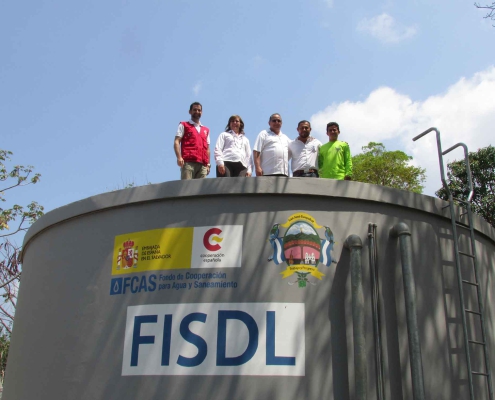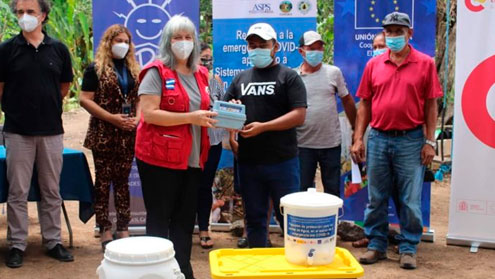OTHER PROGRAMMES ASSOCIATED WITH THE FUND

In addition to those already mentioned, other programmes have been implemented in El Salvador thanks to the EU’s LAIF funding.
At the end of 2020, two programmes were launched: SLV-LAIF-114 and SLAV-LAIF-115, both with the objective of responding to the COVID-19 emergency by supporting drinking water systems in rural communities. The first one was implemented through the humanitarian association PROVIDA, with a budget of 119,000 euros provided by the FCAS. It has enabled the improvement of 22 water systems benefiting 167,612 people and the installation of 8 chlorination systems in the region of Chalatenango, as well as the delivery of 200 protection and biosafety kits and 200 drinking water kits for rural water systems. In addition, the project has been socialised with members of water boards, system administrators and community leaders in order to encourage ownership of the project.
The second of the programmes approved to mitigate the effects of the pandemic was implemented by the Association for Social Economic Development of Santa Marta (ADES). It received a donation of 93,000 euros from the Fund, and enabled various improvements and repairs to be carried out in 63 water systems throughout the country (construction of storage tanks, cleaning of wells and pipes, repair of electrical panels, water quality analysis, etc.). These actions have been carried out in rural and isolated areas, working together with the Association Foundation for Cooperation and Community Development of El Salvador (CORDES), the Federation of Agrarian Reform Cooperatives of the Central Region and the Salvadoran Health Promotion Association.
COUNTRY CONTEXT

Despite being considered a middle-income country, El Salvador faces high levels of poverty, and it is estimated that only 80% of households have piped water (only 66% in rural areas).
The Fund’s actions in El Salvador focus on two lines of work: 1) Increasing water and sanitation coverage in rural areas of extreme poverty (rural systems supply more than 1,200,000 people, but less than half have some form of chlorination) and in peri-urban and precarious urban areas, promoting social participation and community development. 2) Accompanying the process of strengthening the public policy for the management of rural systems, which has not yet been fully defined. In total, the FCAS has allocated 66.2 million euros to various programmes in El Salvador, which, in addition to improving access to water and sanitation services for rural populations, have contributed to the development of the National Integrated Water Resources Management Plan and the National Drinking Water and Sanitation Plan.

